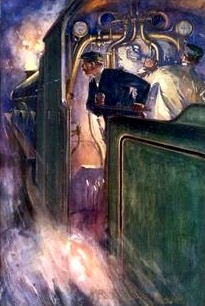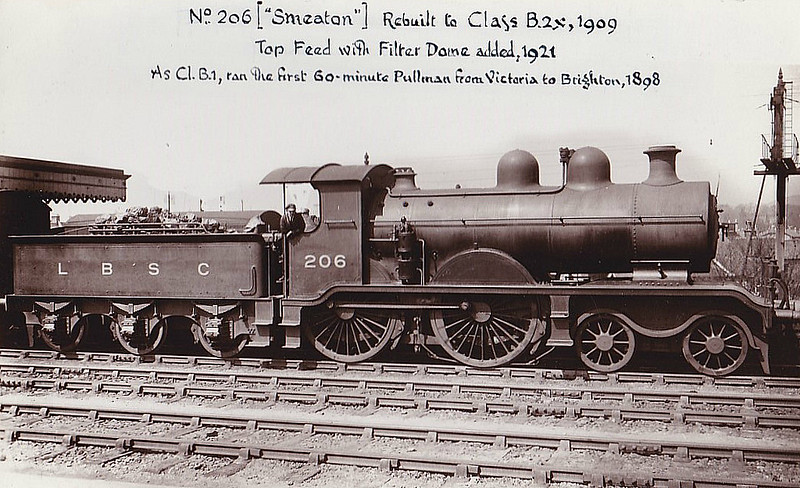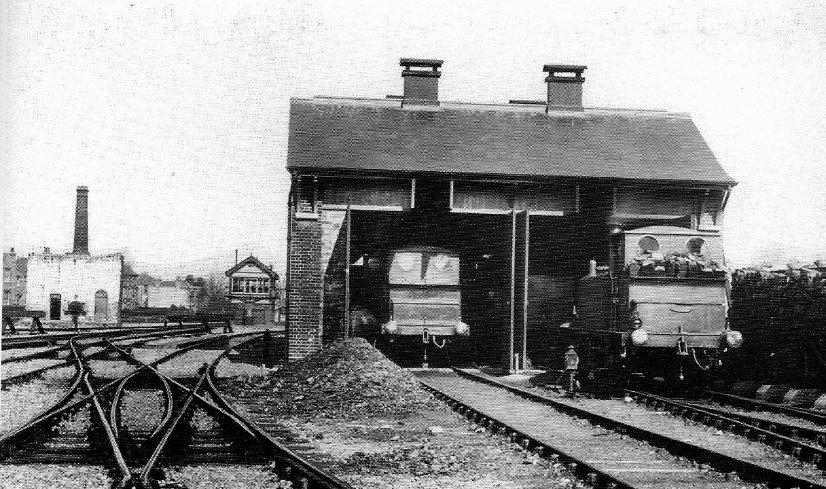
1903
A.S.L.E.& F. to inaugurate a Political Levy and to centralise
the funds of the Society.
lines. The L.B.S.C.R. decided to adopted what they called the “Elevated Electric” system
with overhead wires supply the power at 6,600v A.C. Whilst the London South Western
Railway had chosen the third rail D.C. system to electrify their suburban routes.
ACCIDENTS AT WORK
26th February 1903
New Cross Engine Cleaner Thomas R. Warner was cleaning an engine's buffer in New Cross locomotive shed, when engine shed driver James Funnell moved three engines, but in doing so he moved them against the standing engine moving backwards and crushing Warner and fatally killing him. The accident was due to carelessness of driver James Funnell and his fireman George Bransden in not warning any men working on the standing engine that the movement was taking place. The Company should take immediate action to provide instructions regarding the movement of engines in the locomotive sheds as there are currently no such instructions in force.
27th February 1903
Fireman William Bloomfield (29) Engine driver W. Chadwell was moving towards the Battersea engine shed, and only then noticed was at danager. He tried to stop the engine, but it ran broadside into another engine. Fireman Bloomfield was standing on the footplate at rear of the bunker, was thrown off it by the impact. Bloomfield had seen the signal at danger, and assumed driver Chadwell would have also. Before setting engine in motion driver shouted to his mate asking if he was all right. Bloomfield replied in the affirmative. Chadwell admits blame for the mishap.
William Blomfield had a severely bruised and off duty for seven days.
Triennial Conference of May 1903
It was agreed that Engine Cleaners and Electric Motormen were all allowed to join
A.S.L.E.F. and the establishing of a Political Fund.
PHOTOGRAPHER UNKNOWN
Royal Train conveying King Edward Vll arriving at Eastbourne on July 11 1903.
ACCIDENT AT WORK
22nd July 1903
Fireman Henry Green, during shunting in Horsted Keynes goods yard, Green climbed on to the bunker of the engine to free the coal. Whilst on the bunker, his head hit a loading gauge causing considerable head injuries. Fireman Green breach of ruled. He realised he was in a dangerous position while the engine moving and contrary to instruction. Engine driver Mitchell, also to blame also to blame for allowing his fireman to be in this position during the shunting.

ASLEF COLLECTION
LONDON - BRIGHTON
SPEED RECORD OF 26th JULY 1903
BY BRIGHTON DRIVER JOHN THOMPSETT
extracted and adapted from RTCS book on locomotives of the LBSCR

POSTCARD
On 2nd October, 1898, the Sunday ‘Pullman Limited’ commenced operating and by the turn of the century name of the train was called ‘Brighton Limited’. At this period the L.B. & S.C.R. was anxious to clear itself of its long-standing reputation for dilatoriness, caused partly by traffic congestion on the main line north of Redhill, and some very fast runs were made with the lightly loaded Pullman Limited on Sundays, when the track was relatively clear. This train was timed to cover the 50 ¾ miles between Victoria and Brighton in each direction in exactly sixty minutes, and in the coming years the new engines could cut several minutes of the schedule.
On the 21st December 1901, a speed ran with the down express to Brighton, with a Billinton B4 Class No. 70 'Holyrood,' in 53 minutes and 49 seconds at an average speed of 57 ¼ m.p.h. while on Christmas Day of that year, another B4 Class, No. 68 'Malborough,' completed the same journey in 51 minutes 11 seconds with a maximum speed of 88 m.p.h. near Horley.
This, however, was but a foretaste of what these engines could really do when given their head. About this time there were proposals in the air for a rival electrified line to Brighton, coupled with the specious promise of fifty miles in fifty minutes, and the L.B. & S.C.R. decided to show that whatever electricity could do, steam could do better.
On 26th July,1903, Brighton Driver John Thompsett, with his engine, B4 Class, No. 70 ‘Holyrood,’ a specially light version of the Pullman Limited was prepared, consisting of three eight-wheeled cars and a brake van, making up a total weight of about 130 tons, run the fastest ever return journey between London and Brighton. This engine had established a reputation for fast running and was chosen for the task, the train being ‘Limited,’ which for the occasion had accommodation curtailed to only three Pullmans and a van. The road was specially cleared from Victoria to Brighton, and Driver Thompsett given a free hand to make the best time possible, provided all the Company’s speed restrictions were adhered to, and no unnecessary risks taken. Brighton was reached in 48 minutes 41 seconds at an average speed of 62 ½ m.p.h a time, and a maximum speed of 90 miles an hour near Horley, and was never equaled in the subsequent history of the L.B. & S.C.R.
In the evening the same engine and crew raced the train back to Victoria in 50 minutes 21 seconds, with an average of 60.8 miles an hour and a maximum of 85 miles an hour, and again a record for the Brighton line. Although worthy of the highest praise and forming first-rate advertising could not be indulged in daily without seriously disrupting all other services. There the L.B. & S.C.R. Directors and Robert Billinton, having shown the world what the Brighton could do, very wisely made no attempt to introduce 60 m.ph. services, although a blind eye was turned on those drivers who wish to reduce the schedules by three or four minutes. As in all other runs the second up journey, Driver John Thompsett did not know that he was being timed.
Having shown their paces with these specially prepared runs, the L.B. & S.C.R. felt that such times were not beyond the scope of ordinary traffic conditions. On Sunday, June 30th, 1907, the new Marsh Atlantic No. 37 ran the Pullman Limited from Victoria to Brighton in 51 minutes 48 seconds. The train consisted of five eight-wheeled cars, two twelve-wheelers, and two six-wheeled vans. This was in comparison an even better performance than Holyrood's record run of 26th July, 1903, since it was made under ordinary traffic conditions, with several checks near Earlswood owing to road widening, and a train of nearly double the weight. By this time, however, the rival electric schemes had faded away and the L.B. & S.C.R. settled down to its normal sixty minute schedule.
1903 Brighton drivers designated Brighton Gladstone Class locomotives. which included
Driver Taylor was in charge of No. 193 ‘Freemantle’
Driver Parker, was in charge of No. 184 ‘Carew D. Gilbert’
Driver Sharman was in charge of No.181 ‘Eastbourne’
Driver Wright was in charge of No. 190 ‘Arthur Otway.’
Driver John Thompsett, was in charge of B4 Class, No. 70 ‘Holyrood,’
Charlie Peters was an inspector and a designated trial driver, and was responsible for preparing all the new heavily repaired engines for the road. He also had to take these engines out on trial runs, usually to West Worthing or Littlehampton, as they came out of the shops.

PHOTOGRAPHER UNKNOWN
Bognor Regis second Loco Shed 1903 ~ 1960.
To the left of the picture shows the remains of
the first loco shed 1864 ~ 1903
ACCIDENTS AT WORK
23rd August 1903
Engine driver William Bone, after leaving Chichester working towards Lavant, he found that he left the feed pump not working. He needed to increase water in the boiler and left the footplate to examine the pump. After restarting it and rising from a stooping position, he missed told and he fell from the engine, and received slight injuries. This was an accidentical as the occurrence was exceptional.
1st December 1903
Fireman William Foster (aged 25), whilst working on tank engine No.142, was running bunker in the West Croydon area. Foster had first noticed when a piece of coal threatened to block the bunker hole. Fireman Foster climbed round the back of the bunker to guide the coal down, but fell in front of the engine and the wagons, which fortunately passed over him Foster is blamed for the mishap He admits that in leaving the footplate whilst the engine was in motion, he acted contrary to the instruction.Engine Driver H. Lidbetter did not realise that Foster had left the footplate.
ACCIDENT AND DISABLEMENT
10th December 1903
Battersea engine driver E. Wells accident 10th December 1903, aged 52. Joined the Amalgamated Society of Railway Servants, on the 5th April 1878